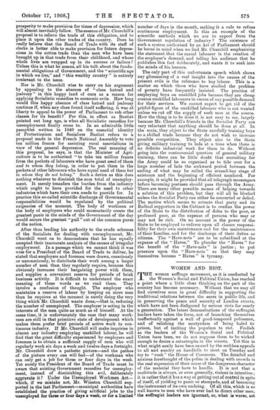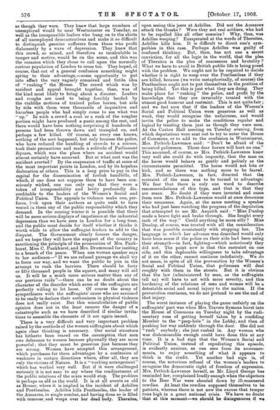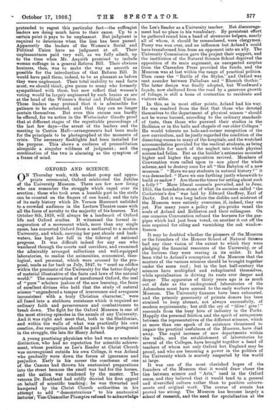WOMEN AND RIOT.
THE woman suffrage movement, as it is conducted by the Women's Social and Political Union, has reached a point where a little clear thinking on the part of the country has become necessary. Without that we may all find ourselves soon in great- difficulty in supporting the traditional relations between the sexes in public life, and in preserving the peace and security of London streets, which have not been disfigured by serious riots for nearly a generation. The latest demonstrations of the suffragist leaders have taken the form, not of launching themselves ineffectually against a wall of good-tempered policemen, and of relishing the martyrdom of being haled to prison, but of inciting the populace to riot. Foolish as the leaders of the Women's Social and Political Union have been, we do not suppose them to be wicked enough to desire a catastrophe in the streets. Yet this is what might easily have been caused by the reckless appeals to all and sundry on handbills to meet on Tuesday and try to " rush " the House of Commons. The detailed and anxious forethought of the police in dealing with crowds is the real expression of their sense of the dangerous character of the material they have to handle. It is not that a multitude is always, or even generally, violent in intention ; it is rather that it has a way of getting out of control in spite of itself, of yielding to panic or stampede, and of becoming the instrument of its own undoing. Of all this, which is so well known to men who have ever had to direct other men, the suffragist leaders are ignorant, or, what is worse, act as though though they were. They knew that large numbers of unemployed would be near Westminster on Tuesday, as well as the irresponsible loafers who hang on to the skirts of all unemployed demonstrations and make it so difficult to distinguish genuine sufferers from those who profit dishonestly by a wave of depression. They knew that this crowd, so mixed, and therefore so incalculable in temper and motive, would be on the scene, and this was the occasion which they chose to call upon the normally curious population of London to come too. They hoped, of course, that out of a, general confusion something might spring to their advantage,—some opportunity to put into effect the very vaguely conceived and futile idea of " rushing " the House. The crowd which was by accident and appeal brought together, then, was of the' kind most likely to bring about a disaster. Loafers and roughs are used to being forcibly herded by the crablike motions of trained police horses, but side by side with them were thousands of inquisitive and harmless people who bad simply come to see what was "up." In such a crowd a rout or a rush of the rougher portion might have produced a panic among the rest, and there would have been nothing surprising if hundreds of persons had been thrown down and trampled on, and perhaps a few killed. Of course, as every one knows, nothing of the sort happened, but only because the police, who have reduced the handling of crowds to a science, took their precautions and made a solitude of Parliament Square, which was the place where an accident would almost certainly have occurred. But at what cost was the accident averted ? By the suspension of traffic at some of the most important points in London, and by its hopeless dislocation at others. This is a long price to pay in the capital for the dissemination of foolish handbills, of which, if one does not suppose them to have been con- sciously wicked, one can only say that they were a Wien of irresponsibility and levity profoundly dis- creditable to the leaders of the Women's Social and Political Union. The appeals to violence make one, per- force, look upon their authors as quite unfit to have vested in them any of the public responsibility which they demand. In the coming winter it is possible that there will be more serious displays of impatience at the industrial depression than we have seen in London for a long time, and the public must decide for itself whether it thinks it worth while to allow the suffragist leaders to add to the disquiet. The Government clearly foresee the danger, and we hope they will have the support of the country in sanctioning the principle of the prosecution of Mrs. Pank- hurst, Miss C. Pankhurst, and Mrs. Drummond for inciting to a breach of the peace. When one woman speaker says to -her audience—" If we are refused passage we shall try to force our way, and we want the public to join in the attempt to rush the barriers. There should be forty or fifty thousand people in the square, and many will aid us. It will be a much more serious matter than any of our previous raids"—there can be no doubt about the character of the disorder which some of the suffragists are perfectly willing to let loose. Of course the army of sympathisers with the suffragists' cause who are assumed to be ready to declare their enthusiasm in physical violence does not really exist. But this miscalculation of public opinion does not in the least remove the danger of a catastrophe such as we have described if similar invita- tions to assemble the elements of it are again issued.
'There is a very difficult and very important problem raised by the methods of the women suffragists about which again clear thinking is necessary. Our social structure has hitherto been reared on the assumption that men owe deference to women because physically they are more powerful ; that they must be generous just because they are strong. Women have accepted this arrangement, which purchases for them advantages by a confession of weakness in certain directions where, after all, they are only the victims of Nature. It is a "working arrangement" which has worked very well. But if it were challenged seriously it is not easy to say where the readjustment of the public relations of the sexes would stop. The problem is perhaps as old as the world. It is at all events as old as Homer, where it is implied in the incident of Achilles and Penthesilea. Achilles kills Penthesilea, the leader of the Amazons, in single combat, and having done so is filled with remorse .and weeps over her dead body. Thersites, upon seeing this jeers at Achilles. Did not the Amazons attack the Greeks ? Were they not real soldiers, who had to be repelled like all other enemies? Why, then, was Achilles weeping ? Exasperated at the words of Thersites, Achilles kills him. It is difficult to direct one's sym- pathies in this case. Perhaps Achilles was guilty of confused thinking. But, then, has not one a secret conviction, for all the logic in the world, that the plea of Thersites is the plea of coarseness and brutality ? What we have to avoid in British public life is being posed with the problem. We ought not to be required to decide whether it is right to weep over the Penthesileas if they are killed, because (we write metaphorically, of course) the Penthesileas ought not to put themselves in the position of being killed. Yet this is just what they are doing. They make plans for "rushing" the police, and profit by the knowledge that they are invariably treated with the utmost good humour and restraint. This is not quite fair ; and we feel sure that if the leaders of the Women's Social and Political Union were generous as well as weak, they would recognise the unfairness, and would invite the police to make the conditions regular and logical by treating them just as though they were men. At the Caxton Hall meeting on Tuesday evening, froin which deputations were sent out to try to enter the House of Commons, or to add to the confusion in Westminster, Mrs. Pethick-Lawrence said : "Don't be afraid of the mounted policemen. Those dear horses will hurt no one." This assumed, of course, as Mrs. Pethick-Lawrence knew very well she could do with impunity, that the man on the horse would behave as gently and politely as the circumstances permitted. The horse would not bite or kick, and so there was nothing more to be feared. Mrs. Pethick-Lawrence, in fact, directed that the restraint of the man was to be turned to advantage) We fear that there is only one word to describe recommendations of this type, and that is that they are mean. No doubt if they were inverted and came from men Mrs. Pethick-Lawrence would at once denounce their meanness. Again, at the same meeting a speaker who had just been watching the progress of the deputation that attempted to see Mr. Asquith said: "Miss Dunlop. made a brave fight and broke through. She fought every inch of the way." Could anything be more silly ? Miss Dunlop, of course, was treated with all the consideration that was possible consistently with stopping her. The language in which her advance was described would only have been sense if the police on their side hail been using their strength—in fact, fighting—which notoriously they did not. The point now is that this restraint on one side, and this deplorable willingness to take advantage of it on the other, cannot continue indefinitely. We do not mean, in spite of all the provocation by the Women's Social and Political Union, that policemen will deal roughly with them in the streets. But it is obvious that the law (administered by men, as the suffragists tell us) will have to act with more severity, and this hardening of the relations of men and, women will be a detestable social and moral injury to the nation.. If the provocation continues, we do not pretend to see the end of that injury.
The worst instance of playing the game unfairly on the suffragists' part was when Mrs. Travers Symons burst into the House of Commons on Tuesday night by the rudi- mentary ruse of getting herself taken by a confiding Member to the "peep-hole" in the Lobby, and then of pushing her way suddenly through the door. She did not "rush" anybody ; she just rushed in. Any woman who was dishonourable enough could have done this at any time. It is a bad sign that the Women's Social and Political Union, instead of repudiating this episode, is evidently anxious, as one sees from its announce- ments, to enjoy something of what it appears to think is the credit. Yet another bad sign is, of course, the notorious refusal of the women's leaders to recognise the democratic right of freedom of expression. Mrs. Pethick-Lawreuce herself, as Mr. Lloyd George has reminded her, complained loudly enough when the objectors to the Boer War were shouted down by ill-mannered rowdies. At.least the rowdies supposed themselves to be patriots, whereas there is not now the excuse that temper runs high in a great national crisis. We have no doubt that at this moment—we should be disiegenuotus if we pretended to regret this particular fact—the suffragist leaders are 'doing much harm to their cause. Up to a certain point it pays to be unpleasant. But judgment is required to determine when the line has been passed. Apparently the leaders of the Women's Social and Political Union have no judgment at all. Their unpleasantness paid very well, as we fully admit, up to the time when Mr. Asquith promised to include woman suffrage in a general Reform Bill. Their obvious business, then, was to make the way as smooth as possible for the introduction of that Reform Bill. It would have paid them, indeed, to be as pleasant as before they were unpleasant. Their total inability to read facts must, we should think, give pause to many who formerly sympathised with them, but now reflect that women's voting would be largely engineered by such brains as are at the head of the Women's Social and Political Union. These leaders may pretend that it is admissible for patience to be exhausted, and that they can no longer eentain themselves. But even this excuse can hardly be offered, for we notice in the Westminster Gazette proof that at different stages of the regrettable proceedings of the last few days—the arrest of the leaders and the meeting in Caxton Hall—arrangements had been made for the principals to be photographed at the moments of crisis. The necessary flashlights had been installed for the purpose. This shows a coolness of premeditation alongside a singular wildness of judgment ; and the combination of the two is alarming as the symptom of a frame of mind.
















































 Previous page
Previous page